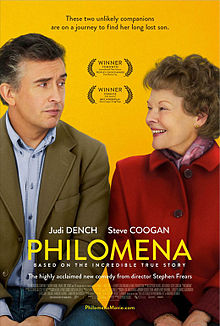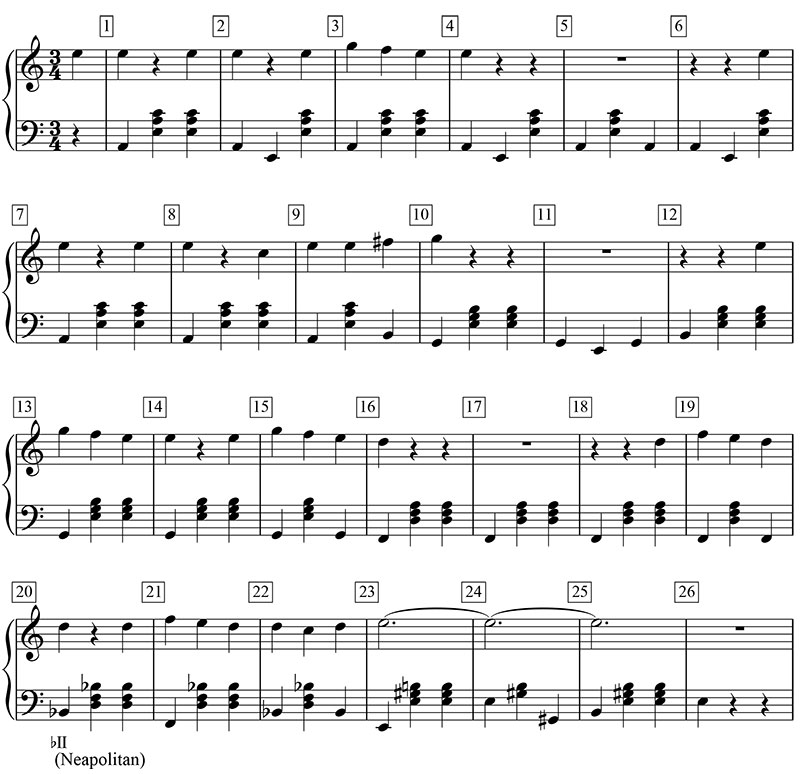
2013 was a relatively quiet year for Alexandre Desplat, at least by the composer’s industrious standard, scoring three films as opposed to the seven of the previous two years. Nevertheless, he has managed to earn his seventh Oscar nomination for his score to Philomena, and his second in consecutive years after last year’s Argo.
The story of Philomena follows Philomena Lee (Judi Dench), an Irish Catholic woman who in her teens had become pregnant and was sent to a convent, her single-parent father feeling she had brought shame upon the family. She was forced to live and work at the convent for several years until she had paid off her cost to stay there. While Philomena agreed to have the convent put her son up for adoption, he was sent away without her notice or ever having said goodbye. Fifty years have now gone by and Philomena has been searching for her son ever since, the convent repeatedly claiming they no longer had any information on the adoption as the records were burned in a fire.
The story’s other half concerns Martin Sixsmith (Steve Coogan), a journalist who has recently been laid off and is desperate for work. After being approached by Philomena’s daughter to write a story on her mother, Martin reluctantly accepts the offer and he and Philomena set off to find her long lost son, Anthony.
Although Desplat takes a fairly traditional approach by drawing largely on a couple of themes as material, only Philomena is given a theme in the sense of a leitmotif. The other theme, which plays an even more prominent role in the film, is associated with recollections of Philomena’s son Anthony/Michael (the latter being his adopted name). A third less pervasive theme is linked specifically with Philomena’s past and the painful memories it continues to bring her. The film music analysis below therefore focuses on the statements and transformations of these three themes.
Philomena’s Theme
We first hear this theme as Philomena lights a candle in a church with a tear in her eye and a look of faint hope and longing:

Hear this below from 0:13:
The theme’s lilting waltz character and darkened minor-key colouring render it both charming and haunting, an apt emotional mix for Philomena in her situation. And in mm. 20-22, the use of the bII (Neapolitan) chord, adds an appropriate sense of tragedy (as we also saw with John Williams’ main theme to The Book Thief). It may at first seem strange to represent Philomena with a waltz theme, but the reason soon becomes clear as this scene dissolves to Philomena’s memory of the carnival where she became impregnated with her son by a young man she met there. As the scene unfolds, we hear Philomena’s theme, but now in a purely carnival-esque treatment, complete with a carousel organ:
Thus, the carnival version of Philomena’s theme may be understood to represent the initial event that brought about her predicament. The theme also appears in a few other guises, each one expressing an emotional nuance for the scene. Listen, for example, to the following version, which we hear as Philomena recalls herself as a teen, reuniting with her son for the single hour she was allowed each day (from 1:02 to the end):
The carousel organ has disappeared and the theme is rescored with violins, vibraphone, glockenspiel, and electric guitar, all played softly and delicately, suggesting both the tenderness of the memory and its focus on her child (especially through the wistful sound of the glockenspiel). And the theme’s subsequent sounding on the solo piano emphasizes the emptiness and loneliness she continues to feel in recalling such memories. In both cases, however, the triple time of the waltz remains as an unmistakable link to the carnival where Philomena’s plight began.
Another transformation of the theme occurs as Philomena remembers her son being taken away without her being notified. She frantically calls out to him from inside the convent, but to no avail. She can only watch in horror as he leaves without her having said goodbye to him. Philomena’s theme here is distorted, now in fragmented tatters, reflecting the state of her life at this moment, and the upbeat triple time lost to a more plodding, heavy-hearted two-beat time. Listen here from 2:24:
Anthony/Michael’s Theme
This theme is even more pervasive than that of Philomena and appears most often in the following form:

In this scene, Martin discovers that Anthony was re-named Michael Hess and finds that he has been deceased for eight years. Philomena is understandably devastated by the news. The moderately slow tempo and scoring in the middle and lower registers of the harp give the theme a cold and ghostly sound that suggests Michael’s absence from the world while the accompanying strings and clarinets add a sense of Philomena’s loving affection for her son. This striking combination, along with the tragedy of the scene, makes this one of the most touching cues in the film.
Anthony/Michael’s theme appears in a few different variations. When Philomena and Martin begin their journey by driving to Philomena’s old convent, we hear the melody for the first time. It is scored in middle to high registers, in a moderately fast tempo and eventually shifting from a minor to a major key, all of which suggests a guarded optimism on Philomena and Martin’s part at the start of their search. Listen below:
Philomena and Martin’s arrival by plane in the U.S. is accompanied by another form of the theme, now completely in a major key and scored in the strings with clarinets and bass clarinet, lending the scene a warmth that suggests Philomena is at last beginning to feel some satisfaction that she is getting closer to finding her son. Also notice the use of the glockenspiel (from 0:49) to again suggest Philomena’s memories of Anthony as a child (listen from 0:34):
This same version of the theme also accompanies Philomena as she watches a home video of Michael in his adult years in what is arguably the film’s most poignant scene.
“Philomena’s Painful Memories”

Whenever we hear this theme, the focus of the scene is squarely on the painful aspects of Philomena’s past, as it occurs either in a flashback or alongside a clear verbal or visual reference. It is first sounded as Philomena recalls her initial months at the convent, facing stern judgement from the head of the convent, Sister Hildegard, who is then seen refusing Philomena pain killers for the breeched birth she is experiencing. Although the theme has a distinct sound from the other two listed above, it retains close ties to them. In the above flashback, for example, we hear the theme in this form:
Notice that the opening ostinato (repeated figure) is similar to that of Anthony/Michael’s theme, but shorter and here played in a fast tempo and in a low register, suggesting both the anxiety and obsessive persistence with which Philomena recalls her memories of the convent. At the same time, notice that at 0:50, a fragment of Philomena’s theme enters in a slower rhythm in the strings (then echoed by the piano) and returns at 1:05. With its buoyant waltz character now replaced with greater tension through longer notes and a more tension-filled two-step time, this subtle reference to Philomena’s theme appears as she is giving birth to her son, suggesting the great concern Philomena has for his life in this scene.
In a later scene, Philomena and Martin begin their inquiries at the convent. As Martin waits for a nun in one of the rooms, he glances thoughtfully at old photos of the nuns. At this point, we hear a hesitant and thinly scored form of the theme, suggesting that Martin is trying to piece together the mystery that has caused Philomena’s painful memories. Immediately after this, Philomena again recalls the most harrowing moment of her past—seeing her son as he is driven away by his adoptive parents. The music here sounds second and third parts of the same theme, both still in a minor key. The second is a plaintive, repeated two-note figure in the piano accompanied by strings, implying the tenderness of the memory, and the third a combination of a soulful cello melody accompanied by the child-like glockenspiel, suggesting the emotional weight of having Philomena’s son torn away from her. Hear all three themes in the clip below, the first from the opening, the second at 0:50, and the third at 1:08:
The first and second parts of the theme return at the film’s end as Philomena and Martin look on Michael’s gravestone and Philomena decides she does want Martin to tell her story after all. While their journey managed to trace Michael’s history, his death leaves Philomena’s emotional wound unable to be healed, hence Desplat’s use of the painful memories theme here. Notice, however, that the second part now gravitates to a more positive major chord alternating with darker chords from the minor mode, suggesting that Philomena has at least found some solace in knowing what became of her son. Hear this version of the theme below from 1:22:
Conclusion
As with most film scores, Alexandre Desplat’s score to Philomena incorporates themes that serve as the main source of its music. But what is unusual about the score is its remarkable economy of material as variations of Philomena’s and Anthony/Michael’s themes account for the vast majority of the music. And it is here that Desplat shows his talent for molding and remolding his themes in subtle ways in order to capture the emotional nuances of a scene. Even when Philomena’s theme, for instance, retains its distinctive waltz rhythm, it is reorchestrated in ways that evoke just the right emotions for the situation onscreen. More than that, Anthony/Michael’s theme undergoes several variations, not only in orchestration, but in its pitches as well, allowing it to be tailored to the narrative while remaining in a subtly recognizable form. No matter how these themes are varied, however, Desplat always manages to write cues that have a strong melodic component, making Philomena an appealingly lyrical score.
Coming soon… Arcade Fire and Owen Pallett’s Her.
Is it possible to purchase piano sheet music for the movie Philomena?
Hi Carol. I just did a quick search around the web but came up empty-handed. It seems piano sheet music isn’t available for this score, which is a shame because it would make for a beautiful arrangement. If you happen across it at some point, please do let me know!
I’ve had the same luck…..
I will let you know if I find anything